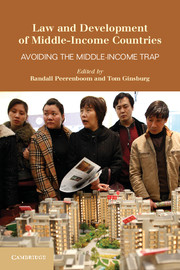Book contents
- Frontmatter
- Contents
- List of Contributors
- Acknowledgments
- 1 Law and Development in Middle-Income Countries
- Part I The Politics of Development in Middle-Income Countries
- Part II Middle-Income Countries in a Globalized Economy
- Part III Good Governance and the Rule of Law in Middle-Income Countries
- Part IV Socioeconomic Challenges in Middle-Income Countries
- 11 The Role of Courts and Constitutions in the New Politics of Welfare in Latin America
- 12 The Judicialization of Health Care
- 13 Nascent Protections in Emerging Giants
- 14 Environmental Challenges in Middle-Income Countries
- Part V International Donor Strategies for Middle-Income Countries
- Appendix Selected Country Data as of 2011
- Index
- References
13 - Nascent Protections in Emerging Giants
Struggles to Judicialize Labor Rights in China and Indonesia
Published online by Cambridge University Press: 05 June 2014
- Frontmatter
- Contents
- List of Contributors
- Acknowledgments
- 1 Law and Development in Middle-Income Countries
- Part I The Politics of Development in Middle-Income Countries
- Part II Middle-Income Countries in a Globalized Economy
- Part III Good Governance and the Rule of Law in Middle-Income Countries
- Part IV Socioeconomic Challenges in Middle-Income Countries
- 11 The Role of Courts and Constitutions in the New Politics of Welfare in Latin America
- 12 The Judicialization of Health Care
- 13 Nascent Protections in Emerging Giants
- 14 Environmental Challenges in Middle-Income Countries
- Part V International Donor Strategies for Middle-Income Countries
- Appendix Selected Country Data as of 2011
- Index
- References
Summary
INTRODUCTION
Roughly 930 million people go to work each day across Indonesia and China. Like many middle-income counterparts, both countries share a history of repression of independent labor organizations and a general lack of respect of labor rights as generally defined in North America or Western Europe. Over the past decade, as China has sought to restore greater equity to its version of “market socialism” and Indonesia has felt its way toward democratization after half a century of military authoritarianism, both have enacted significant measures with an aim of judicializing labor rights and protections. Broadly speaking, Indonesia has created new institutions to facilitate the adjudication of labor rights, while China has laid down new rules to specify labor protections more clearly and forcefully.
Indonesia and China have dramatically different political systems and different levels of per capita gross domestic product (China’s was nearly $1,500 higher than Indonesia’s in 2010, according to the World Bank). They are nevertheless comparable in that they are both large, middle-income countries (MICs) in Asia with developmentalist authoritarian legacies. Tracing the processes by which these two states have moved toward judicialization of labor rights over the past decade thus sheds light on a number of aspects of legal development and change in large MICs.
- Type
- Chapter
- Information
- Law and Development of Middle-Income CountriesAvoiding the Middle-Income Trap, pp. 270 - 287Publisher: Cambridge University PressPrint publication year: 2014



